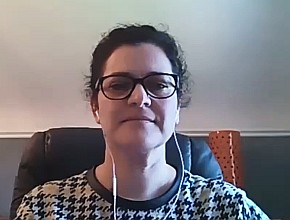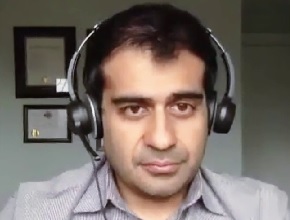Dr Jean-Louis Vincent, professor of intensive care medicine at Université libre de Bruxelles, past president of the World Federation of Societies of Intensive and Critical Care Medicine, and accomplished author and researcher, joins Dr Roman Jaeschke to discuss the epidemiologic situation in Belgium and current standards of care for ICU patients with COVID-19.
For part 2 of the interview, click here.
Roman Jaeschke, MD, MSc: Good morning, welcome to another edition of McMaster Perspective. It’s my immense pleasure to reintroduce Professor Jean-Louis Vincent, who has been guiding critical care for the last few decades by now.
Professor Vincent, I’m going to be attending in the intense care unit (ICU) for the next 2 weeks. Let’s assume I haven’t heard about coronavirus disease 2019 (COVID-19) much. What would be the things you would like me to know and remember as I’m entering it? Maybe I will start by asking you about the situation in Belgium these days. The floor is yours.
Jean-Louis Vincent, MD, PhD: Thank you, Roman. In Belgium, it’s getting really very tough again. The ICUs are full everywhere. We are not overwhelmed; as you know, we have a reasonable number of ICU beds in Belgium. Our health system is actually relatively good so we can still manage, but the personnel is also quite tired and concerned about the risk of a real surge. So right now we can still manage, but we start to transfer patients from one hospital to another whenever we are too busy with patients. Incidentally, it’s worrisome to hear that the mayor of a town nearby Brussels decided that they would no longer accept patients from another region, which is totally unacceptable of course. Hopefully, at the medical level we are still in a good atmosphere and we try to help each other.
So the situation is quite tough. We closed the cafés today, we closed the bars today, because of course these are places where the virus could spread quite easily—especially when people have taken a few beers and start to speak loudly and get excited—but we are concerned that we cannot go back to a lockdown because young people in particular would not accept it. They just want to live, they just want to have a little bit of fun. It’s really getting difficult socially. It’s difficult to keep the balance between the medical imperatives and the social quality-of-life imperatives and we have to navigate between the two.
We have now a new government and they need to take care of that. It’s really difficult. Many people are very upset. Some people feel that we do not do enough and that we should have very strong measures everywhere, and some people feel that we are doing too much and that we have to accept the disease and that some people will die. OK, maybe the weakest will die and the others will still enjoy life and go back to the business almost as usual. So that’s the situation. It’s really quite difficult.
Roman Jaeschke: A new experience for our generation, for sure.
Jean-Louis Vincent: Yes, indeed. Absolutely.
Roman Jaeschke: So, going back to the ICU.
Jean-Louis Vincent: We need to consider that COVID-19 is not just a respiratory problem. Initially people were focused on acute respiratory distress syndrome (ARDS) and we learned first that it’s not only ARDS, because it could be nongeneralized respiratory failure. Still, when patients die it is usually with very severe respiratory failure, but what we have learned over the months is that it is a global disease that actually involves all organs of the body and it’s primarily endotheliitis with coagulopathy.
We and others have reported autopsy series and we have a paper published recently in Critical Care on that. We have a nice series of autopsies, because we do autopsies quite regularly in our institution and in Belgium in general, so we could visualize the alterations in all organs. We know that the virus can be present everywhere, or at least the RNA can be present everywhere. It is really the multiple organ failure that can unfortunately take the patients away.
We had a case of a patient who died yesterday of multiple organ failure associated with severe disseminated intravascular coagulation (DIC) and despite full heparin therapy he got a progression of multiple thrombi, including in the gut. He was operated but it was generalized gut ischemia. That already brings one point: anticoagulation should be generous. We do not have prospective randomized controlled trials (RCTs) on this but we have a number of papers indicating that patients who receive full heparin therapy may have a better outcome than the other patients. So that’s one thing.
The other thing of course is that corticosteroids may be beneficial, dexamethasone in particular. This came from the RECOVERY (Randomised Evaluation of Covid-19 Therapy) trial. But as you may have heard at our International Symposium on Intensive Care and Emergency Medicine (ISICEM) just 2 weeks ago, it’s still a bit debated and there are several editorials or letters in press—one will come out in The Lancet soon and one in Critical Care—challenging a little bit the results, because some aspects of the RECOVERY trial raise some discussions and some suspicions. Not the data—the data are the data and we can believe them—but the interpretation is sometimes a little bit more complicated than the Journal of the American Medical Association (JAMA) suggested. But I would still give dexamethasone.
Roman Jaeschke: If I were to ask you, however, on a practical level, for a person who doesn’t know the intricacies and doesn’t read editorials. I think the steroids are now on in case of getting a patient with reasonable severity, and I think people put the threshold on the requirement for oxygen. Anticoagulation is also going through our minds but I do not think it’s routine at the moment to anticoagulate a person fully without some extra push, either—obviously—thromboembolic phenomena, or at least very high D-dimer. How would you approach that on a practical level?
Jean-Louis Vincent: I agree with your comments. First of all, if we stay with corticosteroids, some people would still like to repeat prospective RCTs on corticosteroids. So I’m just saying that it’s not definitive. However, indeed, in our institution we do give dexamethasone to all patients who are hospitalized and therefore need oxygen. Why would you go to the hospital without receiving oxygen? It’s very rare. So these patients who need oxygen are definitely treated with dexamethasone.
With respect to the anticoagulation, I agree with you that it’s not a standard to give the full anticoagulation to every COVID-19 patient in the ICU; we are speaking about critically ill COVID-19 patients. It’s not a standard, but we tend to be more and more liberal. We tend to give more than just subcutaneous low-molecular-weight heparin and as you suggest, this is particularly true when there are high D-dimer levels indicating fibrinolysis or when there is some form of coagulopathy. Thrombocytopenia is usually not very severe but it can be there and that would be a clue as well. So we tend to be more liberal with the administration of heparin.
Roman Jaeschke: Liberal with unfractionated heparin or low-molecular-weight heparin?
Jean-Louis Vincent: We could shift from low-molecular-weight heparin to unfractionated heparin that we give intravenously. Yes.
Roman Jaeschke: OK, maybe we will stop here, because there are obviously other antivirals and anti-inflammatory drugs and we’ll talk about them in the next sequence of this interview. So, I will stop for a second. I want to thank you very much for this part.
 English
English
 Español
Español
 українська
українська











